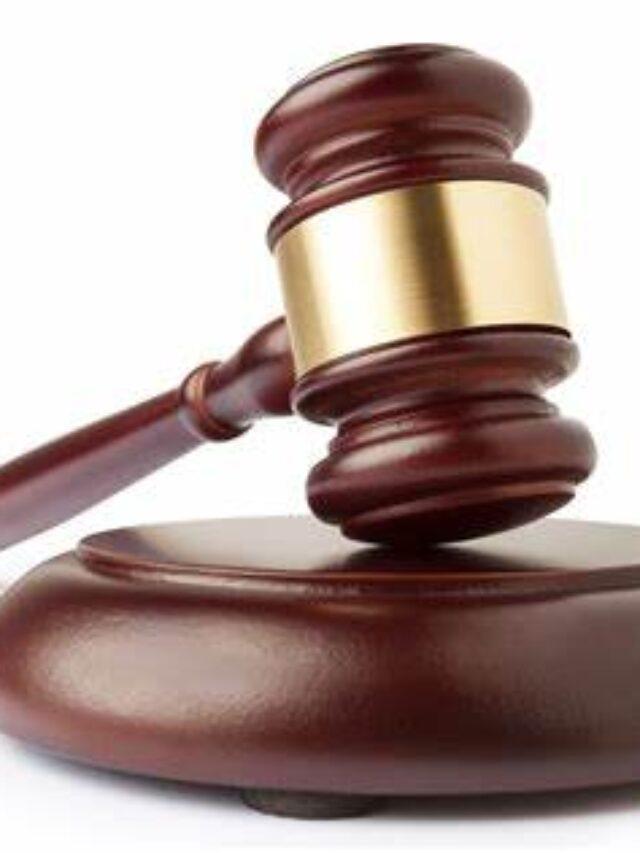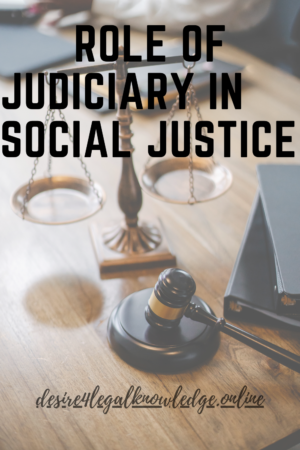7 Amazing Role of Judiciary in Promoting Social Justice
Table of Contents
Introduction to the Role of the Judiciary
It is very crucial to know the role of judiciary in promoting social justice in today’s era. This article talks about it in detail.
The judiciary is one of the three branches of government, the other two being the legislative and executive branches. It plays a crucial role in ensuring the rule of law and safeguarding the rights and freedoms of individuals.
The judiciary is responsible for interpreting and enforcing the law, resolving disputes, and upholding the Constitution. It acts as a check on the other branches of government, ensuring that they do not overstep their constitutional limits and that their actions are in line with the legal system. As the judiciary plays a significant role in society, so it is very important to know the role of it in detail.
In this context, the role of the judiciary in promoting social justice becomes significant. Social justice is the concept of fair and just relationships between individuals and society. It is based on the principles of equality and human rights. It has the power to uphold these principles by interpreting and applying the law in a manner that is just and equitable for all.
In this article, we will explore the various aspects of the role of the judiciary in promoting social justice.
What is the Role of Judiciary?
The role of judiciary is as follows.: –
- Interpreting and applying the law.
- Protecting Individual’s rights
- Resolving Disputes
- Ensuring Accountability
- Promoting Social Justice
- Upholding the Rule of Law
- Setting Legal Precedents
Interpreting and applying the Law-a role of judiciary.
Interpreting and applying the law is a vital role of judiciary. In any legal system, the judiciary is responsible for interpreting and applying the law to resolve disputes and uphold justice. The interpretation and application of law involve analyzing the case, identifying relevant legal principles, and applying those principles to the case.
Judges use a variety of legal sources, including constitutions, statutes, regulations, case law, and legal commentary to help them interpret and apply the law. They often rely on legal precedent. Legal precedents refer to the principle that previous court decisions should guide future decisions in similar cases.
The judiciary’s role in interpreting and applying the law is crucial. As it helps in maintaining the rule of law, ensuring equal protection under the legal system, and protecting individual rights and freedoms. By carefully analyzing the facts and applying the relevant legal principles, judges help ensuring that justice is served and that the law is applied fairly and consistently.
Protecting Individual’s Rights
One of the significant roles of judiciary is protecting individual’s right. It is responsible for upholding the rights of individuals. It also helps in protecting them against the actions of the government or other entities that may threaten their rights. One of the keyways in which the judiciary does this is by interpreting and enforcing the law in a way that ensures that individual rights are respected and upheld.
The judiciary also plays a critical role in ensuring that the government and other entities are held accountable for their actions. When individuals or groups believe that their rights have been violated, they can turn to the courts to seek redress and hold those responsible for the violation accountable.
Overall, the judiciary serves as a crucial safeguard for individual rights. As it ensures that rights are protected and upheld in the face of potential threats from powerful entities such as the government. Through its interpretation and application of the law, it provides a crucial mechanism for protecting the fundamental rights of individuals in a democratic society.


Resolving Disputes
One of the crucial role of judiciary is resolving disputes between parties. When parties are unable to reach a mutually acceptable agreement, they may turn to the courts for assistance in resolving their conflict. The judiciary provides an impartial third party to review the facts and apply the law to the case at hand. This process helps to ensure fairness and impartiality in the resolution of disputes.
Judges hear evidence and arguments from both sides of a case and then make a ruling based on the law and the facts presented. In some cases, judges may also provide recommendations for settlement or mediation. The role of judiciary in resolving disputes helps to ensure that individuals and organizations are held accountable for their actions and that justice is served.
Ensuring Accountability
The role of judiciary, which is, ensuring accountability in a democratic society is very crucial. Judiciary holds public officials and other individuals accountable for their actions. This helps it to maintain the rule of law and promote public trust in the justice system.
One way that the judiciary ensures accountability is through the process of judicial review. This allows the courts to review the actions of the legislative and executive branches of government. This helps it to ensure that they are in compliance with the constitution and other legal rules. The judges can declare laws or government actions unconstitutional or illegal and order them to be changed or stopped. This serves as a check on the power of the government and helps to ensure that officials are held accountable for their actions.
In addition to judicial review, the judiciary also plays a role in enforcing laws and punishing those who violate them. This includes not only criminal laws, but also civil laws. Civil Laws are those laws that are related to contracts and property rights. By ensuring that individuals and organizations are held accountable for their actions, the judiciary helps to promote a fair and just society where everyone is held to the same standards.
Promoting Social Justice
The major role of judiciary is to promote social justice by ensuring that the laws are applied fairly and impartially. The judges ensures that the rights of all individuals are protected, regardless of their social status, race, gender, or any other characteristic.
One of the ways that the judiciary promotes social justice is through the interpretation and application of the law. Judges have the responsibility to interpret the law and ensure that it is applied fairly and impartially. They must also ensure that the law does not discriminate against any particular group.
The judiciary also plays a key role in resolving disputes and ensuring that justice is served. When disputes arise between individuals or groups, the judges are responsible for resolving these disputes through the legal system. By ensuring that disputes are resolved fairly and impartially, the judiciary promotes social justice and upholds the rule of law.
Furthermore, the judiciary ensures accountability by holding individuals and organizations responsible for their actions. This includes holding public officials accountable for their actions and ensuring that they act in the best interests of the people they serve. The judiciary also ensures that businesses and corporations are held accountable for their actions, particularly when they harm individuals or the environment.
Overall, the role of the judiciary in promoting social justice by upholding the rule of law, protecting individual rights, resolving disputes fairly, and ensuring accountability is very important.
Upholding the Rule of Law
The judiciary plays a crucial role in upholding the rule of law. The rule of law is a fundamental principle that holds that everyone, regardless of their position, is subject to the law and no one is above it. In other words, the law is equal for all. This principle requires that the legal rules be applied equally to all individuals and that everyone has the right to a fair and impartial hearing.
The judiciary ensures that the rule of law is upheld by interpreting and applying the law in a fair and consistent manner. It has the power to strike down legal rules that are inconsistent with the Constitution or violate fundamental rights, and it can also review the actions of government officials and agencies to ensure they are acting within the limits of the law.
The judiciary also plays a role in ensuring that the legal system is accessible to everyone, regardless of their social or economic status. This means that individuals who cannot afford a lawyer are provided with legal aid and that court procedures are designed to be understandable and accessible to everyone.
By upholding the rule of law, the judiciary helps to promote a stable and democratic society where individuals are protected from arbitrary or unjust treatment. It also ensures that the government is accountable to the people and operates within the limits of the law.


Setting Legal Precedents
The setting of legal precedents by the judiciary is a crucial aspect of the legal system in many countries. A legal precedent is a decision made by a court that serves as an authoritative example for future similar cases. The importance of setting legal precedents lies in providing clarity and consistency in the interpretation and application of the law. Legal precedents are the most cited role of the judiciary.
When a court sets a legal precedent, it establishes a guiding principle that can be applied in future cases. This helps to ensure that similar cases are treated similarly, providing predictability and fairness in the legal system. It also helps to reduce the likelihood of conflicting decisions by different courts on similar issues.
The setting of legal precedents by the judiciary also contributes to the development of the law. Over time, the accumulation of precedents shapes the interpretation and application of the legal rules, providing guidance to lawyers, judges, and other legal professionals. This development is important for the continued evolution of the legal system, ensuring that it remains relevant and responsive to changing societal needs.
Furthermore, legal precedents provide a mechanism for the judiciary to check the power of other branches of government. By interpreting and applying the law, the judges can ensure that other government actions and decisions are in line with the principles of the legal system. This helps to prevent abuses of power and promote accountability.
In summary, the setting of legal precedents by the judiciary is a critical aspect of the legal system. It helps to provide clarity, consistency, predictability, and fairness in the interpretation and application of the law. It also contributes to the development of the law, checks the power of other branches of government, and promotes accountability.
Epilogue of the Role of Judiciary
In conclusion, the judiciary plays a vital role in ensuring the smooth functioning of a democratic society. It acts as a check on the other branches of the government and ensures that the fundamental rights of the citizens are protected. The role of the judiciary is as to how the judges interprets and applies the law, resolve disputes, uphold the rule of law, ensures accountability, and promotes social justice. The setting of precedents by the judiciary also plays an important role in shaping the legal landscape and providing guidance to future cases. Overall, the role of the judiciary in society is critical and its independence and integrity must be upheld to ensure justice and fairness for all.
I hope you enjoyed this blog on the 7 Amazing roles of the judiciary, if you want some other kinds of blogs, please comment down the topic on which you need a blog. Don’t forget to subscribe to our website to get notifications on recent posts.
FAQs
How does the judiciary ensure equality and non-discrimination in its decisions?
The judiciary ensures equality and non-discrimination in its decisions through various means:
1) Interpretation of Laws: The judiciary interprets and applies laws in a manner that upholds principles of equality and non-discrimination. It examines whether laws or government actions treat individuals or groups unfairly or perpetuate discrimination.
2) Constitutional Scrutiny: The judiciary reviews laws and government policies for their compliance with constitutional provisions related to equality and non-discrimination. It strikes down laws that are found to be discriminatory and ensures that individuals are treated equally before the law.
3) Case-by-Case Analysis: The judiciary examines the specific facts and circumstances of each case to ensure that decisions are fair, unbiased, and free from discrimination. It considers evidence, arguments, and legal principles to arrive at just and equitable outcomes.
4) Precedent and Jurisprudence: The judiciary establishes precedents and develops a body of jurisprudence that sets standards for equality and non-discrimination. These precedents guide future decisions and contribute to the consistent application of principles of equality in the legal system.
How does the judiciary balance the need for social justice with the principles of due process and the rule of law?
The judiciary balances the need for social justice with the principles of due process and the rule of law through several means:
1) Impartial Adjudication: The judiciary ensures fair and impartial adjudication by examining evidence, applying legal principles, and providing an opportunity for all parties to present their arguments. This safeguards the principles of due process and the right to a fair trial.
2) Balancing Rights and Interests: The judiciary weighs the rights and interests of individuals or groups seeking social justice against the principles of due process and the rule of law. It strives to find a balance that upholds justice while respecting legal procedures and the rights of all parties involved.
3) Judicial Activism: In certain cases, the judiciary may take an active role in promoting social justice by interpreting laws expansively or creating new legal principles. However, this is done within the boundaries set by legal principles and the constitution to maintain the rule of law.
4) Legal Reasoning and Justification: The judiciary provides reasoned justifications for its decisions, considering legal principles, precedents, and the overall impact on society. This ensures that decisions are grounded in law and principles of justice, striking a balance between social justice and the rule of law.
How can individuals and civil society engage with the judiciary to promote social justice?
Individuals and civil society can engage with the judiciary to promote social justice through the following avenues:
1) Public Interest Litigation: Individuals and civil society organizations can file public interest litigation cases to bring attention to social justice issues and seek judicial intervention in matters of public importance.
2) Advocacy and Awareness: Engaging in advocacy efforts and raising awareness about social justice issues can influence public discourse and shape the judiciary’s understanding of prevailing societal concerns.
3) Amicus Curiae Briefs: Individuals and civil society organizations can submit amicus curiae (friend of the court) briefs to provide expert opinions or alternative perspectives on legal cases, influencing the judicial decision-making process.
4) Participating in Legal Proceedings: Active participation in legal proceedings as parties or interveners can help individuals and civil society organizations present evidence, arguments, and perspectives that advocate for social justice.
By utilizing these avenues, individuals and civil society can contribute to shaping legal outcomes and promoting social justice through engagement with the judiciary.

